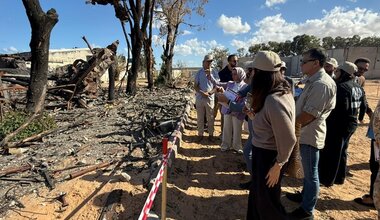Statement by SRSG Martin Kobler on the signing of the Libyan Political Agreement in Skhirat, Morocco
17 December 2015 – Today is an historic day for Libya. Five months ago, on 11 July 2015, the initialling of the Libyan Political Agreement showed the broad consensus on a framework for ending months of destructive violence and political divisions.
Today, participants in the Libyan political dialogue have turned a page in the history of Libya. After a period of political divisions and conflict, Libya is restarting its political transition. The agreement puts in place a single set of legitimate institutions – essential building blocks towards a peaceful, secure and prosperous Libya.
Participating today were representatives of a broad range of Libyan society. They included a wide representation of members of the House of Representatives and the General National Congress as well as important public figures from Libyan political parties, civil society, municipalities and women groups.
The door remains wide open to those who were not present here today; their concerns should be addressed by the Government of National Accord with the support of the United Nations. All Libyans have a role to play in the restarted political transition. National reconciliation and inclusivity has been a basic principle of the Libyan political dialogue, and must continue to guide the work of the new transitional institutions. The Government of National Accord must be a government for all Libyans back in the capital in Tripoli.
We must not forget that this is the beginning of a difficult journey. There is a critical need for national reconciliation and an inclusive national security dialogue. Urgent solutions must be found to bolster the Libyan-led fight against terrorism and in particular the threat of Daesh. The dire humanitarian situation in Benghazi and other areas needs to be addressed as a matter of highest priority, including through the establishment of a dedicated reconstruction fund for Benghazi. The concerns of the Eastern and Southern constituencies should be brought to the forefront. This work must start immediately. The signing of the Libyan Political Agreement is the first step on the path of building a democratic Libyan state based on the principles of human rights and the rule of law.
The United Nations will continue to offer support to the new government. Members of the international community were present here today to show their support for a peaceful and prosperous future for Libya. Ministers and Members of the international community have committed to extend assistance to Libya upon request of the Government of National Accord.
 United Nations Peacekeeping
United Nations Peacekeeping UN
UN








